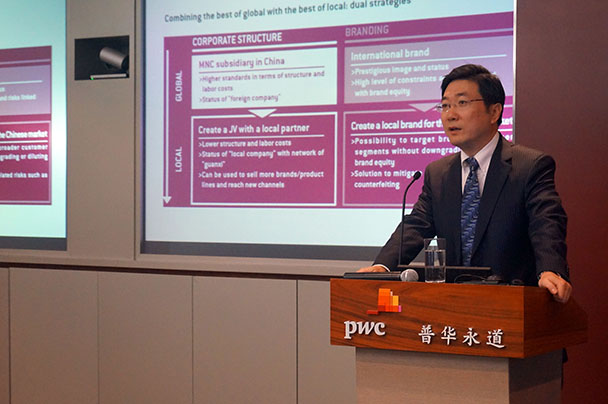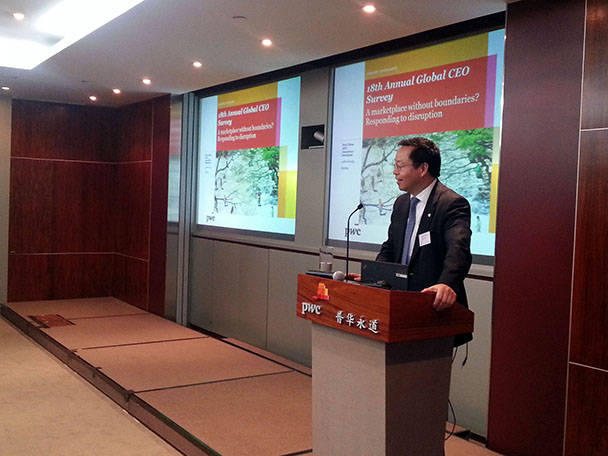High-profile cases in recent months involving foreign companies spanning the tech, auto and healthcare sectors, among others, might suggest that life in China is getting tougher for these enterprises. But the importance of China’s growing market means that many of those MNCs have no option but to carry on regardless.
CKGSB Associate Dean and Professor of Strategic Management, Teng Bingsheng, and David Wu, a Senior Partner at PwC China, offered their thoughts on the issue this morning to CEOs and senior executives from companies such as Shell, BMW, Volkswagen, Merck, Pfizer, Phillip Morris and ANZ Bank, who had gathered at PwC’s Beijing headquarters.

Teng Bingsheng, Associate Dean and Professor of Strategic Management, CKGSB
Dr. Teng began with a discussion of the “Chinese Dream”, and pointed out that MNCs who had entered China in the 1980s and 1990s had done very well, but as the market stabilized after China joined the WTO in 2001, foreign companies in China had found that dream to be ever more elusive. While he noted that the past two years have been among the most turbulent in recent Chinese history, Teng stressed that the situation had already started to deteriorate for MNCs in China before that time, with very few MNCs reaching the expansion targets they had set for themselves back in 2010.
Teng cited the example of UK retail firm Tesco, who had previously sought to jumpstart their business in China through an acquisition strategy, but ended up selling out to a Chinese competitor. He then pointed out that the current headwinds in the market had not just affected MNCs: Coca-Cola was blocked from their potential takeover of Huiyuan Juice – much to the dismay of Huiyuan CEO and CKGSB alumnus Zhu Xinli – on the questionable anti-monopoly grounds that Coca-Cola could transfer their power in the carbonated market over to the juice industry.
But those same market share principles were later dismissed as irrelevant when Qihoo 360 – led by another CKGSB alum, Zhou Hongyi – took tech rival Tencent to court. Teng’s point was that the current environment is particularly turbulent – both for MNCs and for domestic companies – but that it is increasingly important for all to gauge which way the winds are blowing, and to predict when those winds might shift.
Teng then listed MNCs spanning the cosmetics, retail and tech industries who had either scaled back their China operations or had left the country altogether after falling victim to tough competition with local firms. But for those staying behind to contest their respective corners in this potentially lucrative market, what is the answer?
He identified three issues facing firms in China today: higher cost pressures, a changing regulatory environment and increased local competition, before outlining his recommendations to MNCs. Firstly, Teng said, it was important to find the right fit, pointing out that labor intensive businesses will typically no longer work in China. Secondly, he said MNCs should not apply double standards to the Chinese market in terms of premium pricing or inferior terms, because Chinese increasingly know what is happening abroad, and so expect to receive the same deal at home. Lastly, Teng advised MNCs to abandon the old model of outsourcing distribution to Chinese partners, saying that those who were really committed to the Chinese market needed to develop their own distribution channels to cover “the last mile”, especially given the fact that future growth will center on smaller, Tier 2-4 cities.
Earlier, Senior PwC Partner David Wu had outlined his firm’s CEO survey report, a detailed document that had sought opinion from more than 1,300 global CEOs, and the key findings were extremely revealing.

David Wu, Senior Partner, PwC
The disruption caused by digital change was seen by many to provide great opportunities, but an equal number of respondents were wary of new risks posed by this digital transformation. Companies are looking to create new value in other areas: more than half think their companies will start to compete in new industries over the next three years, and one in three have already done so in the last three years. But because a firm’s future competitors might be still unknown in today’s changing environment, many say it is essential to build unlikely alliances and develop a diverse, collaborative network to guard against what may lie ahead.
50% of respondents said headcount would likely increase over the next 12 months, but CEOs as a whole are less confident about the global economy than they were: 17% now think their economic outlook is worsening (compared with 7% last year). Chinese CEOs are even less confident than their international counterparts, due to reasons that include the country’s anti-corruption campaign and the complexity of reform in China.
Likewise, CEOs across the globe have identified a broader range of risks than before, including, but not limited to, overregulation, geopolitical uncertainty, rising taxes, cyber threats and social instability, growing more anxious about almost all threats.
But no one, of course, is treading water and simply waiting to be submerged. As CEOs look to build networks, they are no longer partnering just to expand markets, cut costs or share risks; 54% of CEOs now collaborate to gain access to new and emerging technologies.
Finally, Wu provided six steps that were seen as key to success in 2015: focus on what you’re good at, re-evaluate the business you’re in, anticipate policy issues, build diverse yet aligned partnerships, transform through digital, and develop a good mix of talent.
Food for thought for all in attendance and for many beyond.
.jpg)